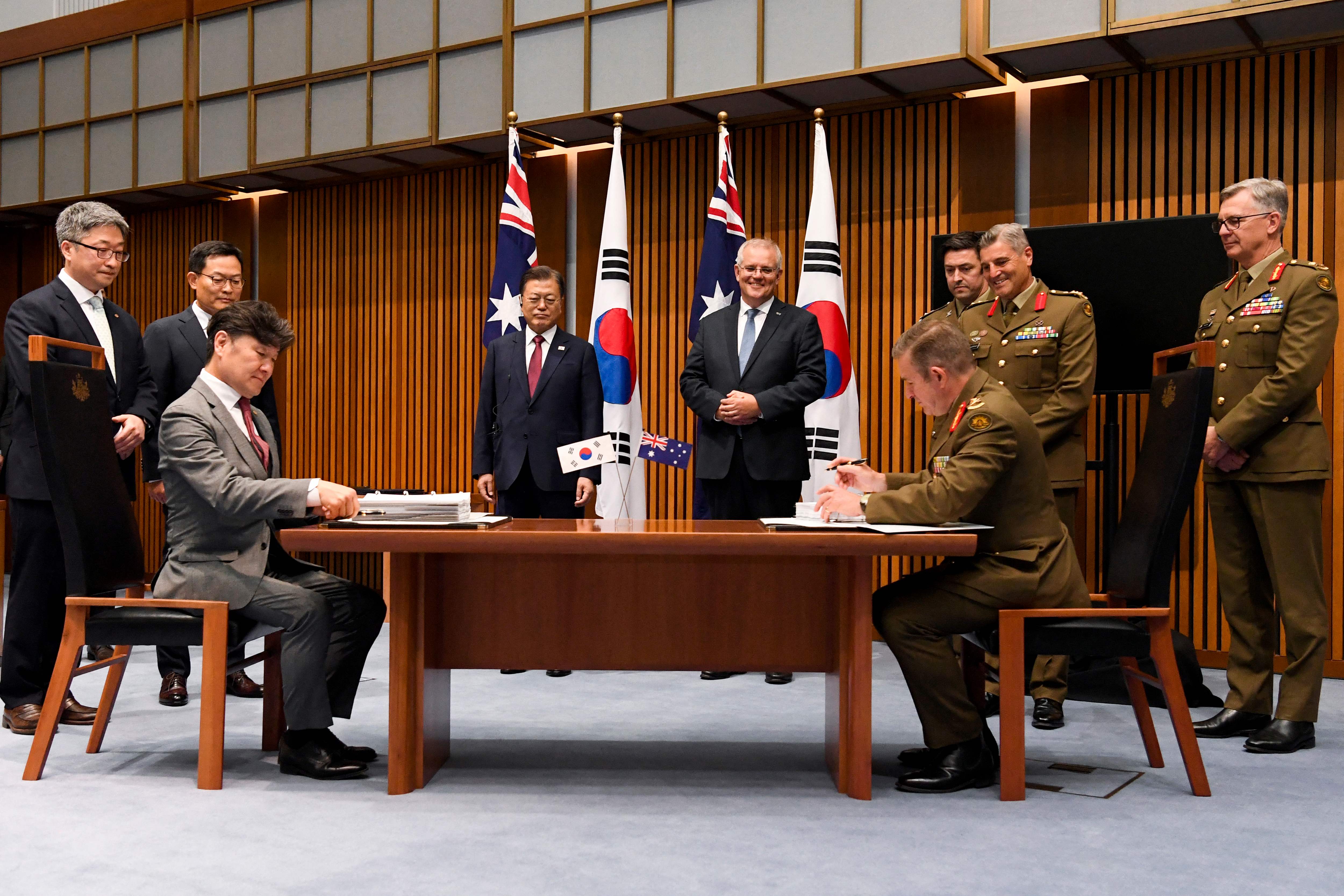South Korea and Australia sign historic $1b defence deal
Sign up now: Get insights on Asia's fast-moving developments

South Korean President Moon Jae-in and Australian Prime Minister Scott Morrison witnessing the signing of weapons on Dec 13, 2021.
PHOTO: AFP
Follow topic:
SEOUL - South Korea and Australia, both of which are key allies of the United States, on Monday (Dec 13) sealed their upgraded “comprehensive strategic partnership” with a historic 930 billion won (S$1.08 billion) defence deal.
It was signed during an official visit by South Korean President Moon Jae-in to Australia. He is the first foreign leader to be invited to Canberra since the Covid-19 pandemic began, and the first South Korean leader to make a state visit to Australia in 12 years.
Mr Moon made it clear on Monday that the visit had “nothing to do with our position over China” amid speculation that it signalled Seoul was willing to play a bigger role in US-led efforts to curb the rise of Beijing.
Unlike Australia which has joined a US-led diplomatic boycott of the upcoming Beijing Winter Olympics over human rights issues, Mr Moon said his government was not considering a boycott and “we have not been asked by the United States or any other nation to join”.
South Korea has been careful to tread a fine line between its biggest security ally, the US, and its largest trading partner, China, and avoid choosing sides in the growing rivalry between the two.
Seoul has resisted getting involved in anti-China initiatives such as the Quad, a security dialogue involving the US, Australia, Japan and India, as well as Aukus, a trilateral security pact between the US, Australia and the United Kingdom.
Addressing reporters in Canberra, Mr Moon said South Korea and Australia “share the same values and are like-minded in our geographical viewpoints”.
“Our alliance with the United States is the cornerstone of diplomacy and security, but on the other hand, economic relations with China are also very important,” he added.
While building a strong alliance with the US, he said South Korea would also work towards maintaining a harmonious relationship with China.
Even though conflict and competition with China was sometimes inevitable, South Korea still needed “China’s constructive efforts for denuclearisation and peace and stability on the Korean Peninsula”, he said.
The South Korean leader also said that the US, China and North Korea all agreed “in principle” on the need to declare a formal end to the 1950-53 Korean War. No peace deal has been signed to end the war and only an armistice has been declared to end hostilities.
Mr Moon said his administration will “work until the end” to bring the parties together to try and resolve all issues on the Korean peninsula.
But time is running out. Mr Moon’s single five-year term is due to end in May next year and a new president is due to be elected next March.
He has been pushing to use the upcoming Beijing Winter Olympics as a platform for sports diplomacy and to revive dialogue with North Korea, but hopes have dimmed now that the US is leading a diplomatic boycott of the event.
In Canberra, Mr Moon stressed the importance of working with Australia to maintain regional peace and deepening collaboration between the two countries which mark the 60th anniversary of diplomatic ties this year.
South Korea is Australia’s fourth largest trade partner and fourth largest export market, with a free trade agreement in place since 2014.
Mr Moon met Australian Prime Minister Scott Morrison on Monday. Both men agreed to boost defence and security cooperation, secure a stable supply of raw materials and to work together on net-zero emissions technology.
The two nations also agreed to cooperate on space, satellite and robotics technologies, and will launch a travel bubble arrangement on Wednesday.
On Monday, South Korean firm Hanwha Defence announced it had signed a contract to supply Australia with equipment including 30 units of the K-9 Thunder self-propelled howitzer and 15 units of K-10 armoured ammunition resupply vehicles.
This was described as the largest defence deal Australia has with any Asian country.
Mr Morisson called South Korea an “important partner” in Australia’s efforts to build its sovereign defence capability.
“Korea clearly understands the challenges that Australia faces in our region and our sovereign interests, and that we need to take steps and form partnerships that enable us to protect our sovereign interests in this part of the world,” he said.
“No one better understands those issues, I think, better than Korea.”

